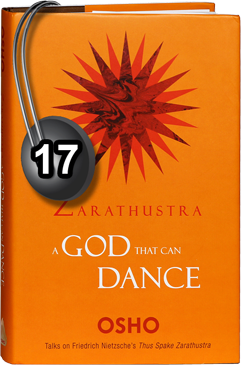The Intrinsic Nature of Virtue
Individual Talk
In stock
"Man has always thought about the meaning of virtue, but no man has ever brought the dimension that Zarathustra brings to the world of virtues. Virtue has always been preached by the religions as a..."
"Man has always thought about the meaning of virtue, but no man has ever brought the dimension that Zarathustra brings to the world of virtues. Virtue has always been preached by the religions as a..."
Osho continues:
"The seed of virtue is within you, it has nothing to do with any reward. It is a reward unto itself. It is not a means to anything, it is an end in itself.
"Zarathustra has to be understood very deeply, because this understanding will change your whole concept of a religious life, of a spiritual revolution, of a new man who will be religious but without religions; who will be religious but without any objectives; whose religiousness will be just a fragrance of his innermost being. And his virtue will be to share it, to bestow it over the whole existence.
"Zarathustra asks his disciples;
"Contemplate on each single point that he is making: it is uncommon, it is unique, it is rare. The moment a virtue becomes common, it ceases to be a virtue. Its being uncommon, its being a rarity, its being something unique is its very nature. If everybody in the world is truthful, truth will not be a virtue anymore. Who will call it a virtue?
"If being compassionate was a common quality of human beings, compassion would disappear from the list of great virtues. In other words, virtues are of the individual, not of the common crowd.
"And secondly, it is useless. Zarathustra's insight into things is so clear, so transparent, so uncompromising, that he has the courage even to say that virtues are useless. Because anything that is useful, is only a means to something else. The useful is always the means, never the end.
"Love cannot be a means to anything. The moment you make your love a means to something, it is no longer love. Love has to remain useless to keep its beauty, its joy, its fragrance. The moment it becomes a means, a staircase to reach somewhere, to attain some end, then the end becomes significant; love becomes insignificant in comparison to the end.
"Hence, love cannot have any end to it – neither can truth, nor good."
"Zarathustra has to be understood very deeply, because this understanding will change your whole concept of a religious life, of a spiritual revolution, of a new man who will be religious but without religions; who will be religious but without any objectives; whose religiousness will be just a fragrance of his innermost being. And his virtue will be to share it, to bestow it over the whole existence.
"Zarathustra asks his disciples;
Tell me: how did gold come to have the highest value? Because it is uncommon and useless and shining and mellow in luster; it always bestows itself."The things that he is saying about gold are true about the highest virtues of truth, of beauty, of good, of love.
"Contemplate on each single point that he is making: it is uncommon, it is unique, it is rare. The moment a virtue becomes common, it ceases to be a virtue. Its being uncommon, its being a rarity, its being something unique is its very nature. If everybody in the world is truthful, truth will not be a virtue anymore. Who will call it a virtue?
"If being compassionate was a common quality of human beings, compassion would disappear from the list of great virtues. In other words, virtues are of the individual, not of the common crowd.
"And secondly, it is useless. Zarathustra's insight into things is so clear, so transparent, so uncompromising, that he has the courage even to say that virtues are useless. Because anything that is useful, is only a means to something else. The useful is always the means, never the end.
"Love cannot be a means to anything. The moment you make your love a means to something, it is no longer love. Love has to remain useless to keep its beauty, its joy, its fragrance. The moment it becomes a means, a staircase to reach somewhere, to attain some end, then the end becomes significant; love becomes insignificant in comparison to the end.
"Hence, love cannot have any end to it – neither can truth, nor good."
| Publisher | Osho International |
|---|---|
| Duration of Talk | 95 mins |
| File Size | 22.34 MB |
| Type | Individual Talks |
| Edition/ Version | 2 |



The information below is required for social login
Sign In or Create Account
Create New Account